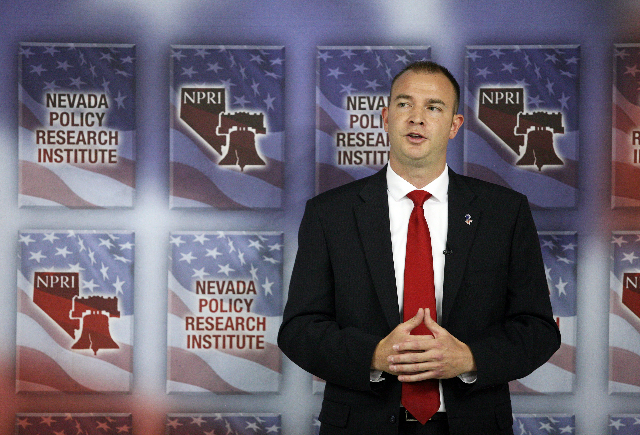GOP congressional candidate pays himself salary from campaign fund
Andrew Matthews quit his paid job as president of the Nevada Policy Research Institute when he decided to run for Congress.
As a Republican candidate in the 3rd Congressional District, he is now getting paid from his campaign funds. The campaign paid Matthews his first paycheck, for $3,200, on July 28, according to his campaign disclosure, which covers July 1 through Sept. 30.
That first check came one day after Matthews filed as a candidate July 27.
Three more paychecks followed, two in August and one in September. Each was for $2,816. That gave Matthews a total salary as a candidate of $11,648 from July through the end of September, records show.
Matthews, who headed the conservative nonprofit think tank that does such policy work as analyzing government salaries and pensions, is the only candidate getting a paycheck from his campaign in this race.
The race is open because fellow Republican and Rep. Joe Heck is running for the seat of retiring U.S. Sen. Harry Reid, a Democrat. The district includes Henderson, Boulder City and parts of Clark County south to Laughlin and west to California.
The Federal Election Commission allows congressional candidates to pay themselves salaries from their campaign funds, but there are rules. One of them says, according to the FEC's published guidebook: "The first payment of salary shall be made no sooner than the filing deadline for access to the primary ballot in the state in which the candidate is running for office."
In Nevada, the filing deadline for congressional candidates is still more than four months away. The filing period is March 7 to 18.
So is Matthews paying himself sooner than the feds allow?
Matthews: Entirely appropriate
Matthews said he was unaware of the rule and agreed to check things out. He later said the FEC told his campaign something different during a phone call before his salary payments started.
"We took the step as a campaign to contact the FEC directly to find out what the rules were," he said. "We were told that as a candidate, I was able to draw a salary from the campaign at the outset and that's what we've done."
Matthews, 37, said he doesn't have any plans to change the arrangement. He also didn't directly answer a question about whether his campaign placed a second inquiry to the FEC for further clarification.
"As far as we've been told, everything we've done is consistent with the guidelines," he said. "We have no new information from them. We're going to continue forward with them in a way that's compliant with the law. So far as we know, what we're doing is entirely appropriate."
An FEC spokeswoman declined to comment on the specifics of that campaign's actions, but referred a reporter to the guidebook of rules and regulations for candidates.
The rule for when campaigns can start paying candidates gained attention during an Ohio congressional race in 2012. Ohio candidate Samuel Joseph Wurzelbacher, who gained fame as "Joe the Plumber" after a 2008 interaction with a campaigning Barack Obama, had to refund to his campaign a $1,000 salary payment, according to a published report on www.cleveland.com.
In that case, the $1,000 payment came in November, while the primary filing deadline was Dec. 31, according to the report. That campaign called it a mistake.
Matthews' salary was the singular largest expense for the first quarter of his campaign, amounting to 41.1 percent of his campaign's expenditures of $28,325 during that quarter.
He said his goal is to keep his salary as low as possible, so that as much money as possible can go toward the campaign and getting his message out.
Under the rules, candidates cannot be paid a salary that exceeds what they earned the prior year. Nor can they be paid a campaign salary that is higher than what a member of Congress gets.
For Matthews, his pro-rated earning rate as a candidate is less than his annual salary at NPRI, which was roughly $80,000.
Matthews has spent the most money of all the other candidates in the race. He's also the only one paying himself a salary.
Nevada's primary election will be held June 14, the general election Nov. 8. Members of Congress serve two-year terms. They're paid $174,000 a year, plus benefits.
Other candidate spending
Here's a look at candidate expenditures in the race, as of Sept. 30, when the third-quarter filing period ended:
— Michael Roberson, a Republican and Nevada Senate majority leader, spent $24,158. His single biggest expense of the quarter was $6,496 in merchant processing fees. Other expenditure examples include $2,000 in Internet consulting, $4,700 in website services.
— Republican Danny Tarkanian, a sports facility owner, came close to that, spending $23,550, including $4,000 on website design and development.
— Democrat Jesse Sbaih, an attorney, spent $14,372, and his expenses include $3,239 in Web hosting and development, credit card processing fees. He also has paid $6,562 for event planning fees and compliance consulting.
— Republican Annette Teijeiro, a medical doctor, spent $2,966.
Review-Journal database editor Adelaide Chen contributed to this report. Contact Ben Botkin at bbotkin@reviewjournal.com or 702-387-2904. Follow him: @BenBotkin1






















